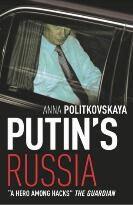Book Review: Putin’s Russia by Anna Politkovskaya
reviewed by anna battista
 On 1st September 2004, when news broke out about children being taken hostage in a school in Beslan, North Ossetia, investigative journalist and reporter for the Russian paper Novaya Gazeta, Anna Politkovskaya, decided to flew there. She wanted to try to negotiate the release of the hostages (she had acted as a mediator also in 2002, during the Dubrovka theatre siege) and allow Aslan Maskhadov, former Chechen president and rebel leader to come out of hiding and convince the hostage-takers to free the children. Yet, getting to Beslan proved quite difficult since all the flights had been cancelled. Politkovskaya ended up spending a long evening at Vnukovo airport and eventually managed to get on a plane directed to Rostov-on-Don. While on board, she had a cup of tea, then, suddenly, she started to feel sick. She woke up only a few hours later, in Rostov regional hospital, without being able to remember anything. Behind her mysterious incident, she claims, there are the Russian intelligence services, the FSB, who wanted her out of action.
On 1st September 2004, when news broke out about children being taken hostage in a school in Beslan, North Ossetia, investigative journalist and reporter for the Russian paper Novaya Gazeta, Anna Politkovskaya, decided to flew there. She wanted to try to negotiate the release of the hostages (she had acted as a mediator also in 2002, during the Dubrovka theatre siege) and allow Aslan Maskhadov, former Chechen president and rebel leader to come out of hiding and convince the hostage-takers to free the children. Yet, getting to Beslan proved quite difficult since all the flights had been cancelled. Politkovskaya ended up spending a long evening at Vnukovo airport and eventually managed to get on a plane directed to Rostov-on-Don. While on board, she had a cup of tea, then, suddenly, she started to feel sick. She woke up only a few hours later, in Rostov regional hospital, without being able to remember anything. Behind her mysterious incident, she claims, there are the Russian intelligence services, the FSB, who wanted her out of action.
The story of Beslan and of Politkovskaya’s poisoning, are not included in her latest book Putin’s Russia (The Harvill Press), but many other stories are collected in this harrowing volume. The author opens her book with a chapter about the army in Russia and about soldiers being abused, beaten, tortured and even sold as slaves by their officers. The chapter also concentrates on a mother’s desperate search for the body of her son who died during a battle and was left behind on the battlefield. Readers will be confronted by a terrible and shocking reality in the pages that will follow: an army officer raping and killing a Chechen girl and expecting to walk free after the trial; a corrupt judicial system; the decline of the Russian intelligentsia; the dire conditions in which submarine engineers and admirals live in Kamchatka where the local nuclear fleet is rusting; the Urals mafia illegally taking possession of many local industries; the silence of the servile Russian media; the Chechen war and the war on terrorism; the lies of the government during the Dubrovka theatre siege in 2002, where 129 people died when the special services released gas into the building.
Politkovskaya analyses the situation in Chechnya, but also the hatred, violence and racism Chechen people have to face every day in Moscow, themes that have fascinated Politkovskaya since 1999 when she first started reporting about Chechnya, which also became the topic of her previous award winning book A Dirty War: A Russian Reporter in Chechnya (The Harvill Press, 2001).
Mr Putin, supported and encouraged by European leaders Berlusconi, Blair, Schröder, Chirac and by American President Bush, is compared in the book to Soviet leader Josef Stalin, Nikolay Gogol’s character Akaky Akakievich more concerned with his image than with his soul, and to an over-promoted spy inadequate to govern the country. Mr Putin, Politkovskaya warns, is simply moving the country back to a Soviet-style dictatorship. “Why do I so dislike Putin?” Politkovskaya will wonder towards the end of the book, “I dislike him for a matter-of-factness worse than felony, for his cynicism, for his racism, for his lies, for the gas he used in the Nord-Ost siege, for the massacre of the innocents which went on throughout his first term as President.”
Politkovskaya’s style is raw but haunting and the best thing of her book are undoubtedly all the interviews the author made with simple people, ordinary men and women who seem to have lost all hope of getting any protection from the state and who expect nothing but unfair trials and unfair verdicts.
Putin’s Russia, a book supported by the English PEN, deserves to be read because it is definitely the best non-fiction book published this year, but also because it is written by one of the bravest and most passionate journalists around.
Copyright (c) 2005 erasing clouds |
|